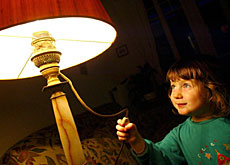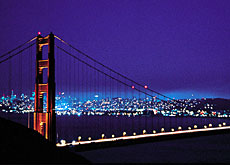Voters to decide on electricity market

Swiss voters are deciding whether to liberalise the electricity market and bring Switzerland into line with the rest of Europe.
The outcome is expected to hinge on whether people believe electricity prices are likely to rise following deregulation.
The government is in favour of liberalisation, but opponents of deregulation fear it could lead to price hikes and job losses.
At the moment Switzerland’s electricity is run largely at cantonal level, and consumers are forced to buy their power from the local supplier.
Under the new law consumers would be able to shop around for an electricity supplier, comparing prices and forms of power.
The supply lines, however, would be administered by a single national network company which would guarantee power producers access to all parts of the grid.
Opposition and confusion
Although deregulation has the support of the Swiss government, business and industry, there is opposition from the trade unions, and confusion among left wing and green parties, who are divided on the issue.
Rolf Zimmermann, general secretary of the Swiss Federation of Trade Unions, sees no reason to tamper with a system which, he claims, works perfectly well now.
“Right now we have a simple system, where the electricity supply is administered by the communities,” Zimmermann told swissinfo.
“The new law will make the consumer responsible for supply, and that is just too risky.”
Zimmermann and other opponents of deregulation point to evidence from neighbouring countries such as Germany and Austria, where consumers are apparently confused and irritated by the bureaucracy of having to choose their own electricity supplier following liberalisation.
Consumer choice
But supporters of the legislation claim consumer choice is one of its attractions. Electricity users will, for example, be able to stipulate that the bills they pay are invested in green, or renewable energy.
“I think that’s one of the strong points of the new law,” said Katharina Stampfli of Swiss Electric, the umbrella organisation which brings together Switzerland’s six biggest power producers.
“It’s the very first time that consumers will be able to really control the energy they buy,” Stampfli told swissinfo.
“At the moment you’re not sure what you get from your electricity provider.”
In the long run, this could mean a restructuring of Switzerland’s power industry, with less emphasis on nuclear power.
Rural reassurance
And although the trade unions have argued that liberalisation could mean price rises and job losses in rural regions, the Swiss association of alpine cantons has come out in favour of the new law.
The association has been reassured by a clause in the law which allows the government to forbid extreme regional price differences, and by a commitment to the promotion of hydro-electricity, which is a big employer in the mountain areas.
Nevertheless, Rolf Zimmermann remains unconvinced, particularly by the government’s argument that deregulation will happen whether Switzerland introduces a law on it or not.
“The government claims that the electricity market is already open, and that’s just not true,” said Zimmermann.
“We wanted a debate about some of the negative experiences of deregulation, for example in Scandinavia (see related article), but that’s a discussion the government just did not want to have.”
Price question
For ordinary Swiss, the vote on Sunday probably comes down to how much they would have to pay for their electricity following deregulation.
Unfortunately, that’s a question that is very hard to answer. Rolf Zimmermann is convinced that ordinary households will have to pay more. Katharine Stampfli, however, believes this is unlikely.
“I’m sure if consumers shop around and compare prices they may be able to reduce their bills,” she said.
But Stephan Vaterlaus, an energy analyst with Plaut Strategists, is not sure that liberalisation will bring big savings for consumers.
“I think prices may fall a little bit in the short term,” he said. “But in the long term I just can’t say what will happen. That’s the point of a free market: prices can fall, and they can rise.
“But consumers certainly should not expect the major price reductions which we saw following the deregulation of the telecommunications industry.”
Deregulation inevitable
Vaterlaus, however, agrees with the Swiss government that some form of deregulation of Switzerland’s electricity market is inevitable.
“We are in the process of opening the electricity market throughout Europe, including Switzerland,” Vaterlaus told swissinfo.
“The only question is whether we have a controlled process or a free for all.
“If voters reject the new legislation on Sunday, the government will simply have to draw up a modified proposal. Having no law at all is just not possible.”
swissinfo, Imogen Foulkes
Switzerland’s electricity industry accounts for 20,000 jobs
There are 1,200 electricity utilities in Switzerland.
55 per cent of Swiss electricity comes from hydroelectric power, 40 from nuclear power.
Switzerland’s small businesses buy SFr3.5 billion worth of electricity every year.

In compliance with the JTI standards
More: SWI swissinfo.ch certified by the Journalism Trust Initiative

You can find an overview of ongoing debates with our journalists here . Please join us!
If you want to start a conversation about a topic raised in this article or want to report factual errors, email us at english@swissinfo.ch.